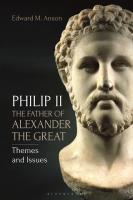
Bloomsbury Academic (2020) h/b 272 pp £52.50 p/b £17.49 (ISBN 9781350103948)
Too often overshadowed by his son Alexander, Philip the Great (as the Introduction styles him) steps into the limelight in this slim yet comprehensive study. A. has chosen to focus on five main themes—Macedonia before Philip; Philip’s reorganisation of the Macedonian army; his creation of the Macedonian nation; his safeguarding of that nation; and his imposition of hegemony on the wider Greek world—and, while this may not be a standard biography in the strictest sense, there emerges a well-drawn picture of a man who was at once charismatic and duplicitous, strategic and opportunistic, a military genius, a canny administrator and a brilliantly cunning negotiator.
There emerges, too, a vivid picture of the society into which Philip was born, and which he so drastically changed to suit his own ambitions. Parcelled out as a hostage in his youth before being acclaimed first among equals by the land-owning elite of Lower Macedonia at a time of existential crisis, he rapidly reformed and reequipped his army, leading them to vital victories, swelling their ranks thanks to monies raised by annexing Thracian gold and silver mines, ensuring the loyalty of a newly created middle class thanks to well-judged gifts of land, and consolidating hard-won territories by planting cities in their midst, before, exploiting age-old rivalries between mainland Greek poleis, he expanded his power south through the Greek mainland, appointing himself Apollo’s agent in two sacred wars, and crushing Athens, Thebes and their too-little, too-late alliance at Chaeroneia (the ‘pinnacle’ of his career). Uniting the defeated city-states behind his banner, he was about to launch a campaign against Persia, when he was killed by a lone assassin.
Contributing importantly to the overall discussion are three short appendices, the first discussing Philip’s ambitions (A. avers that, being primarily a Macedonian nationalist, he intended to extend his rule only as far as Caria, and not to conquer Persia), the second his attitude to his own divinity (despite his statue being displayed alongside those of the twelve Olympians, A. believes that he saw himself as an agent of the gods rather than a god himself), and the third his assassination (A. exonerates both Alexander and Olympias and believes that it was the disgruntled bodyguard, Pausanias, alone ‘who dunnit’). Intriguingly in these appendices, A. pulls together the threads of his more expansive discourse elsewhere in the book to explore not only Philip’s relationship with Alexander, for whom A. posits Philip’s ambition of a marriage to the daughter of the Persian Great King, but his evolving view of himself as leader and avenger of the Greeks.
Meticulously researched and argued, with copious references to and discussions of primary and secondary sources, the book explores each of A.’s chosen topics in a depth and style that may appeal more to scholars than to the general reader, who might find that its thematic structure gives rise to (perhaps unavoidable) repetition. For interested students of both Philip and Alexander, on the other hand, this volume (with four maps, a chronology—which includes a useful discussion of the problems of accurate dating—notes and a comprehensive bibliography) is undoubtedly an important addition to the shelves. And if opponents of the ‘great man’ view of history should object to some of A.’s conclusions, I suspect that he will not be disconcerted: ‘the key element in Philip’s success’, he declares, ‘was Philip.’
David Stuttard
